A Zoomcast & Podcast series presented by
The International Buddhist Exchange Center (IBEC) @ Kodosan
in advance of its new major publication for 2023
Engaged Buddhism in Japan: Historical Perspectives & Contemporary Exemplars
debuting on Youtube and Spotify on April 15, 2022!
In 2006, the International Buddhist Exchange Center (IBEC) @ Kodosan in Yokohama began documenting and supporting the work of a number of Japanese Buddhist priests and lay people becoming increasingly involved in the social problems plaguing post-bubble Japan. These issues ranged from end-of-life care, suicide prevention, homelessness, and peace. Over the years, such work expanded to meet new challenges, such as disaster relief care and anti-nuclear activism after the tragic triple disaster in northeast Japan on March 11, 2011. In the space of these now sixteen years, a specific new Socially Engaged Buddhist movement has grown in Japan to meet these challenges. It is a dynamic, wide ranging, ecumenical, and increasingly critical one, the likes of which Japan has not seen since perhaps the dynamic activities of Buddhists in the Meiji era over 100 years ago. Case studies of these contemporary activities as well as a deep investigation into the roots of Socially Engaged Buddhism going back to Buddhism’s introduction to Japan in the 6th century will be the focus of a major new publication by IBEC in 2023, tentatively titled An Engaged Buddhist History of Japan: Historical Perspectives & Contemporary Exemplars. To preview this work to wider audiences and provide inspiring exposure to the ongoing work of many, IBEC is launching a zoomcast/podcast series this Spring 2022. See below for the schedule of speakers and further details!
April 15: End-of-Life Care & Buddhist Naikan Therapy with Rev. Mari Sengoku 千石真理 (Jodo Shin Pure Land Hongan-ji denomination 浄土真宗本願寺派)
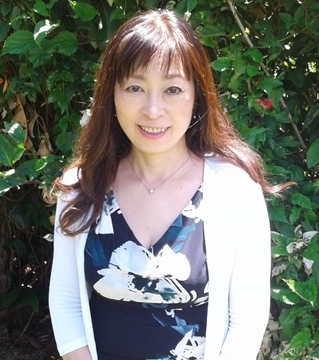
Rev. Sengoku was the first Buddhist chaplain at the Vihara Hongwanji Nursing Home and Asoka Vihara Clinic for terminal patients, established by the Jodo Shin Hongan-ji denomination in 2008 in Joyo City, Kyoto. She presently is a chaplain trainer and supervisor for the Rinsho Buddhism Chaplaincy Training Program 臨床仏教師養成プログラム and is the founding director of the Awakening Mind & Body Naikan Center 心身めざめ内観センター in Tottori. Click here for Youtube zoomcast & Anchor podcast
May 6: Child Poverty with Rev. Shinmyo Noda (Rinzai Zen Myoshin-ji denomination)
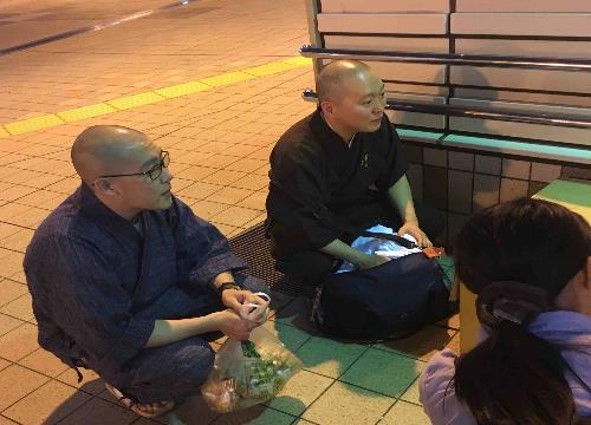
Rev. Noda is the vice-abbot of Rinsho-ji temple located in Kasugai, a suburb of Nagoya City. He completed his training and gaining certification as a Rinsho Buddhist chaplain in 2020. During his training, he did his residency work under Rev. Gakugen Yoshimizu and the Hitosaji One Spoonful Association supporting the homeless in northeast Tokyo. He completed his training at an intensive care nursing home in Nagoya. While being active in the Association of Religious Professionals Confronting Life, a network for suicide prevention based in Nagoya, his main activities are as a leader in the regional network of the Temple Snack Club (お寺おやつクラブ otera-oyatsu kurabu) providing food and basic support for children of single-parent families living in poverty. Click here for Youtube zoomcast & Anchor podcast
May 27: Suicide Prevention with Rev. Soin Fujio (Rinzai Zen Kencho-ji denomination)
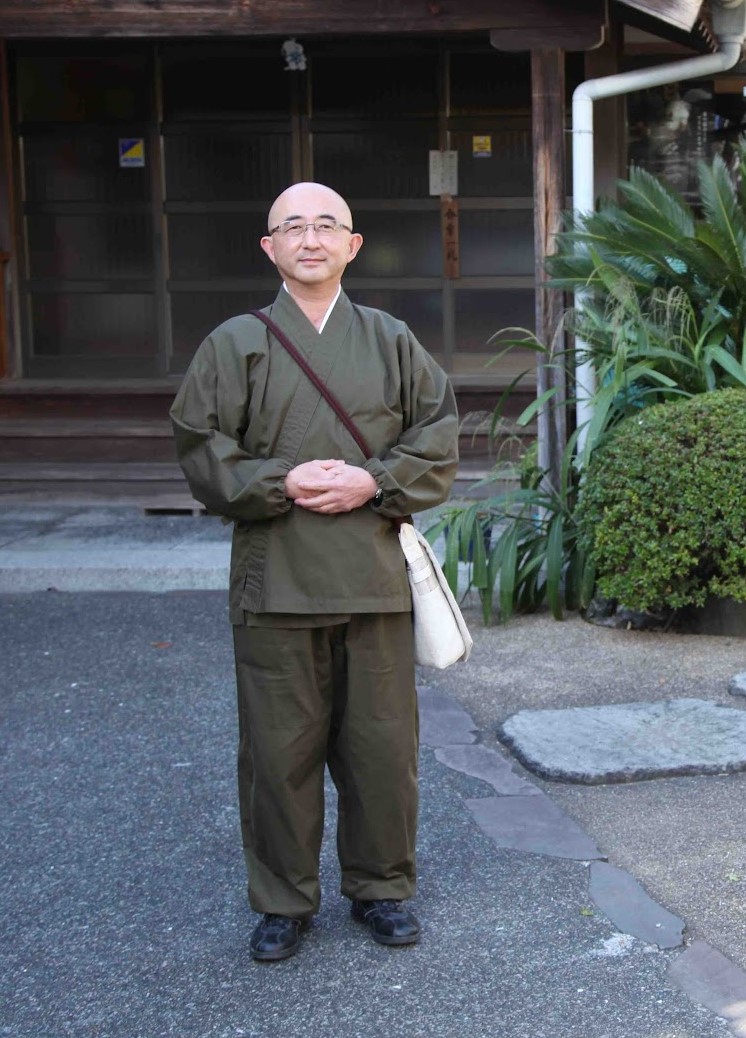
Rev. Fujio is the abbot of Doku-on-ji temple in Yokosuka city, south of Yokohama and near a huge U.S. naval base. Born in his family’s Rinzai temple, he spent some twenty years in the Japanese banking world serving in overseas branches in the U.S., Singapore, and Thailand. Upon ordaining and returning to his home temple, he began counseling the mentally ill and suicidal, while also regularly teaching Zen meditation and Tai-chi to Japanese and international students. He is a co-founder of the ecumenical Association of Buddhist Priests confronting Self-Death and Suicide, where he trains young priests in counseling work. He also works at the Yokosuka City Hall as a “gatekeeper”, helping at risk individuals find the proper social resources to deal with mental illness, family problems, and other social challenges. Click here for Youtube zoomcast & Anchor podcast
June 23: Buddhist SDGs from the Ground Up: Community Building and Environmental Activism with Rev. Hidehito Okochi (Jodo Pure Land denomination)
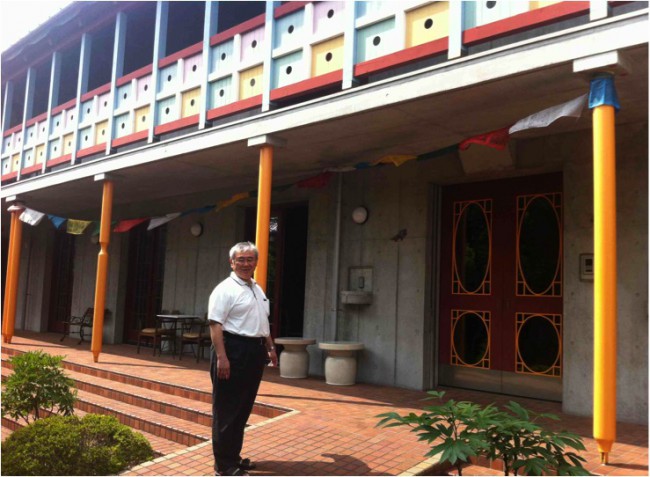
This special video, created by a group of graduate students in the Erasmus Mundus Joint European Master in Environmental Studies, presents to us the problem of the “Disconnected Society” (無縁社会 mu-en shakai) in Japan and the wider global phenomenon of societies built on unsustainable corporate capitalism that damages the outer ecology of our planet as well as the inner ecology of our spirits. The work of Rev. Okochi at his Juko-in eco-temple in Tokyo shows a comprehensive response to this crisis through a form of holistic and integrated Dharmic development (bhavana 開発 kai-hotsu). Rev. Okochi has been a leader in the religious based anti-nuclear energy movement in Japan since the early 1990s, a long time activist in child’s rights and protection issues, and an advocate for social justice issues in Japan. His comprehensive eco-temple activities created the inspiration for the Eco-Temple Community Development Project of the International Network of Engaged Buddhists (INEB), a network of diverse eco-temples across Asia. The video concludes with a look at The Smart Pagoda, an affiliate eco-temple in Thailand. Click here for Youtube video & Anchor podcast
July 15: International Cooperation & Advocacy with Ms. Mika Edaki
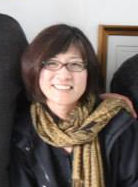 Mika is the Director of the AYUS International Buddhist Cooperation Network. AYUS is part of the family of Japanese Buddhist NGOs formed from the late 1970s to 1990s to address a variety of humanitarian crises across Asia. AYUS was created by a group of Jodo Pure Land denomination priests as an interdenominational Buddhist NGO. It specializes in supporting other grassroots NGOs who often struggle to gain funding for their work in local areas in Asia and other crisis points in the world like Palestine and Afghanistan. Mika has been an active participant in both JNEB and INEB activities, especially supporting humanitarian causes in Myanmar over the decades and the suffering of nuclear disaster victims in Fukushima. Mika has also partnered with other female Buddhists in Japan to raise awareness of discrimination and structural barriers to women’s empowerment in Buddhism. Click here for Youtube video & Anchor podcast
Mika is the Director of the AYUS International Buddhist Cooperation Network. AYUS is part of the family of Japanese Buddhist NGOs formed from the late 1970s to 1990s to address a variety of humanitarian crises across Asia. AYUS was created by a group of Jodo Pure Land denomination priests as an interdenominational Buddhist NGO. It specializes in supporting other grassroots NGOs who often struggle to gain funding for their work in local areas in Asia and other crisis points in the world like Palestine and Afghanistan. Mika has been an active participant in both JNEB and INEB activities, especially supporting humanitarian causes in Myanmar over the decades and the suffering of nuclear disaster victims in Fukushima. Mika has also partnered with other female Buddhists in Japan to raise awareness of discrimination and structural barriers to women’s empowerment in Buddhism. Click here for Youtube video & Anchor podcast
August 9: Buddhist Chaplaincy with Rev. Fuminobu Komura (Tendai denomination)
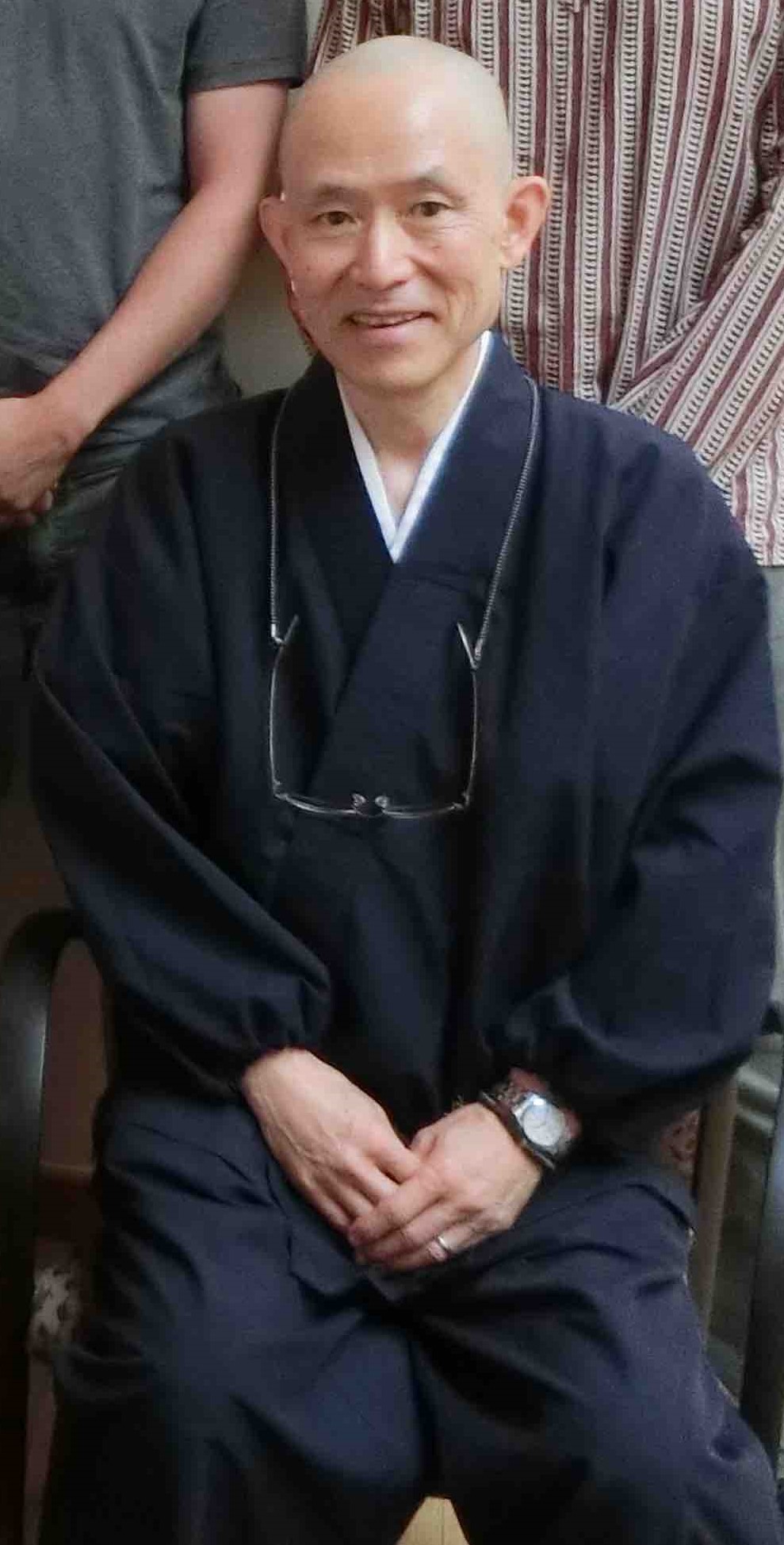
Rev. Komura is a Staff Chaplain at the Hospital of the University of Pennsylvania in Philadelphia. After 37 years as an engineer at Hitachi Ltd. in Japan, Rev. Komura entered the ancient monastic practice center on Mt. Hiei near Kyoto and gained ordination as a Tendai denomination. Seeking to live a life as a Buddhist chaplain, he studied in the United States at Naropa University in Boulder, Colorado, founded by the eminent Tibetan Buddhist master Chogyam Trungpa. He did his chaplain residency at John Hopkins Hospital in Baltimore before moving to Philadelphia.
September 30: Public Seminar “Bodhisattva Vows for Post-Industrial Japan: Buddhist Perspectives on Social Ethics and Social Justice in Japan” with Prof. Susumu Shimazono, Rev. Hidehito Okochi, and others
This seminar will examine the problem of the role of religion and social ethics in Japan since the end of the war. With the bankruptcy of Japan’s religious traditions in support for violent imperialism, Japanese lost faith in religion and Japanese society became deeply secular. Despite this secularism, public morality still seems to be a recycling of pre-war and medieval themes of the veneration of authority and diligent self-sacrifice. Further, the militarization of society during the war continues to leave its imprint on society with the prevalent practice of relational bullying (ijime) and an authoritarian hierarchy. These trends appear to be reaching their limit with high levels of mental illness and employee burnout leading to the creation of an “alienated society” (mu-en shakai). Due to Buddhism’s marginalization since the advent of modernization in the 19th century, its role in forming post-war social ethics has been largely muted.
In the first two decades of the 21st century, however, a new movement of Socially Engaged Buddhism has been encouraging priests to become more socially active and public minded; for example in the fields of end-of-life care, suicide prevention, disaster trauma, poverty alleviation, anti-nuclear and environmental activism, and even political issues concerning peace and social justice. In many of these activities, we are witnessing Buddhists promoting a new kind of social ethics based in bodhisattvic compassion to meet the “alienated society”. They are encouraging people to extend beyond their own circles of interest to become concerned with and care for those who have fallen outside of social support systems. They are articulating and practicing a new sort of social ethics for modern Japan based in universal compassion and non-violence that differs greatly from the often violent and inward group oriented one of the modern industrial era. The panelists of this seminar will discuss these themes and the potential for Socially Engaged Buddhist ethics with its balance between individual and collective awakening to contribute to social justice and democracy in Japan.
For more videos and profiles of such Socially Engaged Buddhists in Japan, see our national conference from December 2020!